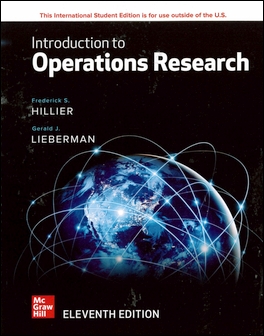書籍分類

Introduction to Operations Research 11/e
作者:Frederick Hillier, Gerald J. Lieberman
原價:NT$ 1,780
ISBN:9781260575873
版次:11
年份:2021
出版商:McGraw-Hill
頁數/規格:992頁/平裝單色
參考網頁:Introduction to Operations Research 11/e
版次:11
年份:2021
出版商:McGraw-Hill
頁數/規格:992頁/平裝單色
參考網頁:Introduction to Operations Research 11/e
內容介紹 本書特色 目錄 作者介紹
- (E-Book) Introduction to Operations Research 11/e
Description
Introduction to Operations Research is the worldwide gold standard for textbooks in operations research. This famous text, around since the early days of the field, has grown into a contemporary 21st century eleventh edition with the infusion of new state-of-the-art content.
INFORMS recognized Introduction to Operations Research with a prestigious Expository Writing Award.
The award citation described the reasons for the book's award as follows:
"Two features account for this success. First, the editions have been outstanding from students' points of view due to excellent motivation, clear and intuitive explanations, good examples of professional practice, excellent organization of material, very useful supporting software, and appropriate but not excessive mathematics. Second, the editions have been attractive from instructors' points of view because they repeatedly infuse state-of-the-art material with remarkable lucidity and plain language."
分類位置:
理工 > 社會科學 > 研究方法
商管 > 管理 > 研究方法


